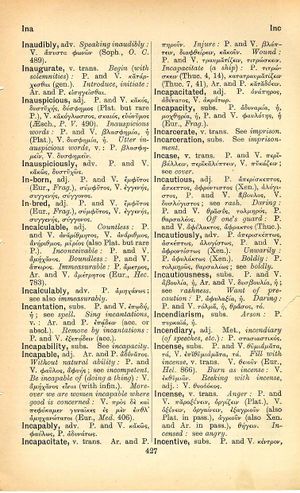incapable: Difference between revisions
διὸ δὴ πᾶς ἀνὴρ σπουδαῖος τῶν ὄντων σπουδαίων πέρι πολλοῦ δεῖ μὴ γράψας ποτὲ ἐν ἀνθρώποις εἰς φθόνον καὶ ἀπορίαν καταβαλεῖ → And this is the reason why every serious man in dealing with really serious subjects carefully avoids writing, lest thereby he may possibly cast them as a prey to the envy and stupidity of the public | Therefore every man of worth, when dealing with matters of worth, will be far from exposing them to ill feeling and misunderstanding among men by committing them to writing
(Woodhouse 3) |
(CSV4) |
||
| Line 1: | Line 1: | ||
{{ | {{Woodhouse1 | ||
| | |Text=[[File:woodhouse_427.jpg|thumb|link={{filepath:woodhouse_427.jpg}}]]'''adj.''' | ||
Ar. and P. [[ἀδύνατος]]. | |||
<b class="b2">Without natural ability</b>: P. and V. [[φαῦλος]], [[ἀφυής]]; see [[incompetent]]. | |||
<b class="b2">Be incapable of</b> (<b class="b2">doing a thing</b>): V. [[ἀμήχανος]] εἶναι (with infin.). | |||
<b class="b2">Moreover we are women incapable where good is concerned</b>: V. πρὸς δὲ καὶ πεφύκαμεν γυναῖκες ἐς μὲν ἐσθλʼ ἀμηχανώτατοι (Eur., ''Med.'' 406). | |||
}} | }} | ||
Revision as of 09:44, 21 July 2017
English > Greek (Woodhouse)
adj.
Ar. and P. ἀδύνατος. Without natural ability: P. and V. φαῦλος, ἀφυής; see incompetent. Be incapable of (doing a thing): V. ἀμήχανος εἶναι (with infin.). Moreover we are women incapable where good is concerned: V. πρὸς δὲ καὶ πεφύκαμεν γυναῖκες ἐς μὲν ἐσθλʼ ἀμηχανώτατοι (Eur., Med. 406).

